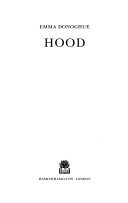Reviewed by brokentune on
Hood is my third foray into the works of Emma Donoghue. Neither of my two previous attempts to engage with her writing have been, what I would call, successful. It's not that her books did not make an impression on me, it's just that the impression I got from her writing strongly reminded of a caricature character of a feminist pop singer in Father Ted.
The reason I still read Hood was because I accidentally downloaded it onto the kindle. Oh, well.
To my surprise, Hood I actually was quite an interesting story of the closeted relationship between Pen and Cara, set in Dublin during the early 1990s.
I will not come as much of a spoiler if I say that the book deals with Pen's coming to terms with the end of this relationship and in the process finding herself.
In a lot of ways, Hood reminded me of Greene's The End of the Affair, and I was wondering a couple of times if Greene's classic had had any influence on Hood. In hindsight, I doubt there was an influence, tho. Where Greene's story focuses on a character who is obsessed with himself and projects this on his lost lover, Hood's story begins with a story of Pen's obsession with Cara and materialises into Pen finding confidence in herself by having to interact with the world around her as an individual rather than as part of a couple.
There were a couple of aspects that I thought were great to read in addition of Pen's story: One was the description of Pen's and Cara's relationship in the context of Ireland in the early 1990s, in which the presence of the Catholic Church seemed to be ubiquitous (which did not help my trying to shake off the Father Ted impression I have).
Donoghue's description of people being on their guard in public and fearing for their jobs if they lived outwardly in same-sex relationships created an atmosphere of pretty tense isolation.
"What seemed like hundreds of strangers were clustered by the door to commiserate with Mr Wall as we struggled out. He was introducing Kate to many who would remember her only as the dark girl, the one who went off to the States with her mother and never came back. I held back, not wanting to hear him fumble for a title for me."
By the end of the book however, I was not sure whether this description was a representation of the times or whether it was used more as a plot device. Without going into detail, the end of the book seemed to indicate that some of the isolation may have existed in Pen's perception more than in the community around her. But then, Pen's reality is her perception, isn't it.
The second aspect that I found interesting was the way in which Pen's perception changes. Again, without spoiling the plot, Pen's grieving process was pretty realistic. It was both funny and sad to see her go through it.
‘It’s a very long story.’ The words glided out of my mouth, surprising me. ‘I’ll tell you when the tea’s made.’ This birth is long overdue, mother. It’ll be a tight squeeze. You’d better open your arms to this screaming red bundle, because it’s the only one I’ll ever bring you. ‘Grand,’ she said. ‘I’ll open a packet of biscuits.’
While all of this was fascinating, I still can only say that as a whole I liked the book. But just that.
Despite the setting and the character development, there were also aspects I really did not care for.
The first one was that despite the strong background setting, I never got the feeling that the novel rose to a level of literary excellence. While reading, I always had the feeling that I accidentally picked up a clumsily written installment of a steamy pulp romance series. This didn't work for me. I should clarify that there is nothing amiss with a steamy pulp romance but it was not what I was looking for in Hood.
What annoyed me more about this than the clumsy writing, tho, was that it distracted from the issues that had been touched on and that could have been elaborated on - like the relationship with Pen's mother or Mr Wall, or Kate.
But no, instead, Pen suddenly, and seemingly out of nowhere, obsesses about someone she only just met - Cara's sister?
I just didn't get it.
Reading updates
- Started reading
- 14 February, 2016: Finished reading
- 14 February, 2016: Reviewed
